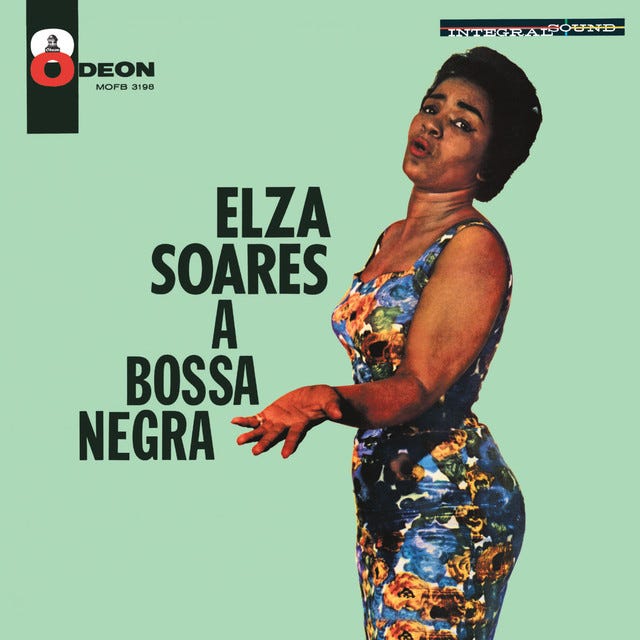EVERY GENRE PROJECT - May 2 - Sambalanço
Genre of the Day - Sambalanço 🇧🇷
Album of the Day - A Bossa Negra by Elza Soares (1960)
May 2, 2024
Singing is one of the most cathartic human activities. You read somebody like Billie Holiday’s story, or Tina Turner’s, or Stevie Ray Vaughan’s, and understand just why they felt a deep-seeded need to throw their voice up to the heavens—and gain a little cash doing so. This is the story of Elza Soares. Her early life was rife with excruciating trauma, and she was a mother to four children by the time she was twenty. A different path was set for her, though, thanks to her magnificent voice. By the time she was nearing 70, BBC would hail her as the Brazilian artist of the millennium (unless any of the singers living in pre-colonial Brazil have anything to say about it from the beyond).
Looking frumpy in clothes that didn’t fit her, she appeared on a 1953 show competition and blew the crowd away with the potency of her voice, citing “hunger” as the place she was from. A star was born. You might say rags to riches, but becoming the biggest sambalanço star and a pop music touchstone in Brazil didn’t come without the tribulations of celebrity. In the late ‘60s, she became involved with the soccer—okay, football—star Mané Garrincha. An expert in ignoring red flags as much as an expert vocalist, Soares did so even though Garrincha was technically married, but he’d already had two children this time and divorce was illegal in Brazil. Suffice to say it was a little more complex than that. Time and time again in this situation, it’s always the woman who gets painted as the man-stealing temptress rather than any rightful blame being leveled towards the man, and Soares endured national scorn due to the pairing. Identified as a ‘subversive couple’, stories say that the military fired into their home in 1970 causing Soares to flee to Italy for some time.
That context may not necessarily be important to this genre’s musical definition, but the stories of the figures who shape our music always hold weight because it affects their interpretations and the genre’s place in the musical canon. Such stories suffuse a particular emotional quality that helps us connect with the music further. Despite the hardships and drama of Elza Soares’ life, she ascended to the queendom of sambalanço, a popular combo of samba rhythms with American, typically big-band styled jazz. While possessing similar basic stylistic origins as bossa nova, bossa nova had more overt cool jazz influences and eventually an ideological shift towards Brazilian instrumentation. Sambalanço, which peaked in the ‘60s, aligns with hotter jazz, the grand sounds of big band.
From timestamp 1:41 of this album, Elsa Soares proves she has the voice to match and even exceed the raucous horns of the big band influence and use balanced force and subtlety to vocally transcend. She interjects in the horns’ conversations of “Boato”, invokes her inner actress on the insistent “Beija-Me”, and draws from a well of sentiment on the tender “Cadeira Vazia”. She possesses the rare type of lioness voice that makes fame seem inevitable, but she doesn’t deploy that vocal firepower willy-nilly; she’s in a constant dialogue with the horn breakdowns and swinging samba grooves, innately knowing when her voice will carry the most urgency. Across unique sambalanço compositions and translated standards like “Mack The Knife”, she sings like she’s still waiting for a big break, and all she needs is a big band to match. It’s a delightful listen, and one of my favorites on this column so far. Brazil, you’ve done it again.


